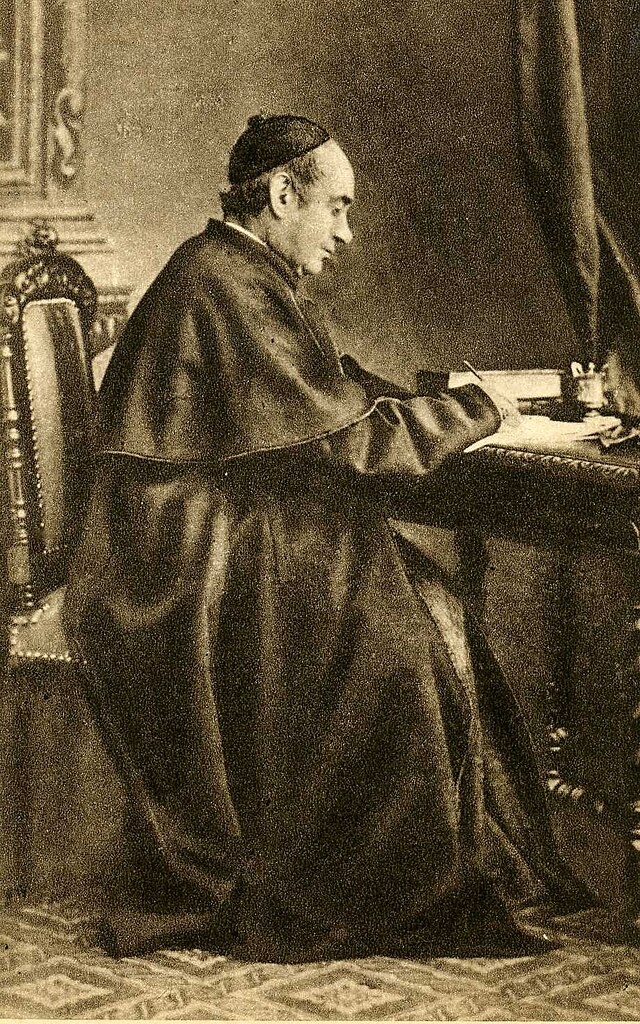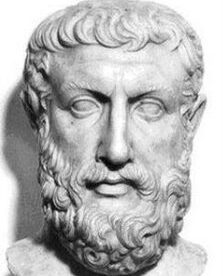
Foto del P. Claret escribiendo. A. Trinquarts, París, 1868.
Available from St. Bonaventure Publications and Our Lady of Victory School
Book Length: 248 pages
He was satisfied with very little.
His parish was wide and its houses far apart,
but he never neglected—for rain or thunder,
sickness or trouble—to visit on foot,
with a staff in his hand,
the furthest in his parish, the great and humble.
He gave this noble example to his sheep:
that he practiced first and preached afterwards.
He took this motto from the Gospel
and added further added this saying:
that if gold rusts, what shall iron do?
For if a priest in whom we trust be corrupt,
it is no wonder if an ignorant man go to rust.
Geoffrey Chaucer, The Canterbury Tales 1
The priest will inevitably influence the faithful—but the question is, will he do so for better or for worse? Will he betray the golden dignity of his status as an alter Christus, or will he strive to imitate the sublime example of Our Lord? The Parson chose the second path; and so too did a real priest, St. Anthony Mary Claret. Chaucer’s wording for his fictional priest can be aptly applied in describing the priestly ministry of this saint, whose personality and life is so modestly unveiled and yet veiled in his Autobiography.
From whence did this apostle of modern times derive his power? Surely, his labors were superhuman; these plain facts related in the Preface by Thomas Nelson, the founder of TAN Books, both astonish and inspire:
To think that in 35 years of priesthood, he wrote 144 books (at the end of his life, he could not even remember how many) and preached an estimated 25,000 sermons, we would have to conclude that this alone was simply extraordinary…It is said of him that he heard confessions as much as 15 hours a day, and by his own testimony, he walked everywhere he went, even from town to town.
(vii)
When us Catholics read such things, there is a temptation to believe that we could never accomplish similar heights of heroic virtue according to our own state in life. We may think there is something lacking in ourselves, and this is true enough. But this lacking consists not in something we cannot change, but rather in something that really is in our power to change—our own disposition. This change of disposition must involve a deep humility, a constant recourse to Providence which Christ explained must take the form of childlike submission, for He said:
Amen I say to you, unless you be converted, and become as little children, you shall not enter into the kingdom of heaven.
– Matthew 18:3
St. Anthony understood this very well, for he writes:2
Just as a mill, no matter how well it may be set up, cannot work if it has no water, so also neither can I continue to live in this natural and physical life unless God helps me.
(97)
We too depend upon the generosity of God, in things both spiritual and physical. We did not come into this world without His permission, and upon Him our existence is contingent. He, as Holy Writ informs us, “maketh his sun to rise upon the good, and bad, and raineth upon the just and the unjust” (Matthew 5:45). The worldling does not avail himself of this important truth; he is either ignorant of it or scorns it when he is reminded of it. The faithful Catholic, on the contrary, is both reminded of and reminds himself of the many gifts of Our Heavenly Father. Such gifts are both personal and public, ranging from recalling the bliss of a devout Communion to encountering the pleasurable singing of the birds while out on a walk. Humility, then, as has been often related, is the foundation of sanctity—for where there is no humility, there cannot be true charity.
Charity and humility then move a soul to love God in spirit and in truth, to go deeper into the mystery of the spiritual life. The soul that loves God loves what He loves and hates what He hates. Moved by a profound zeal which had been tried in youth in a variety of ways, as St. Anthony tells us himself, the saint was given such a love for God and for the salvation of souls redeemed by the Precious Blood of Jesus that he later wrote in all earnest pleading:
Ah, if a noble gentleman were to see an innocent and virtuous lady being injured and maltreated, he would not be able to contain himself, but would take measures to defend her. Then what ought I not to do, seeing God so offended and so outraged?
…
Stop sinners, stop! Do not scourge my heavenly Father more by your sins. You have lashed Him enough, and have torn open far too many wounds. If you do not wish to stop, lash me, for I have indeed deserved it. But do not outrage or maltreat my God, my Father, and my Love any more! O my Love, my God, my Love!
(59)
If only more of us had such an attitude towards Our Heavenly Father and the sinners who offend Him! Though the pollution of indifferentism is far more rampant today than it was in the Victorian times our saint lived in, we should still seek—as St. Anthony did extraordinarily well—to find opportunities to convert the poor sinners of our twenty-first century, who are ever more bold than the poor sinners of the nineteenth, from their manifold ways of offending the Divine Majesty!
It takes humility to follow Christ. The more obvious part of this humility consists in meekness and bearing one’s crosses, though this submission is often quite repulsive to our fallen nature. But there is another part which appears to be less discussed and less written about—humility consists also in our recognition that indeed, we have been chosen. “You have not chosen me: but I have chosen you,” (John 15:16) says Jesus Christ.3 Though speaking in time to His apostles, His eternal mind assuredly accounted for ourselves when pronouncing these words. For not only did He know the future, but as Holy Writ records, Christ mentioned all those who were to come into the Faith in His prayer for those first disciples:
Sanctify them in truth. Thy word is truth. As thou hast sent me into the world, I also have sent them into the world. And for them do I sanctify myself, that they also may be sanctified in truth. And not for them only do I pray, but for them also who through their word shall believe in me.
– John 17:17-20
Therefore, it is a false sentiment to exhibit a sort of shyness towards Heaven on account of our infirmities and evident inferiority to its inhabitants. Added to this, we should not shy away from imitating Our Lord and the saints in practical matters. Instead, we ought to read the Scriptures and the lives of the saints with a prayerful disposition. There, we shall encounter inspiration; love will chase out fear, and light will be given us to extract useful lessons for our own lives. St. Anthony, by his own frequent spiritual reading, was deeply moved by these sacred examples. He writes:
What has always moved me more than all else is the contemplation of Jesus Christ going from one town to the other, preaching everywhere, not only in big towns, but also in small villages, even addressing a solitary Samaritan woman when He was resting by the wayside and suffering from thirst.
(63)
I frequently read the lives of those saints who have been outstanding for their zeal for the salvation of souls, and I have found that this reading produces salutary effects.
(64)
Now, such examples did not terminate in moving the interior life of this saint. No, they truly moved him, for they did so to the point that he applied their lessons in practical matters with great effect to his own ministry. The charity of Christ inspired him, for example, to approach the preaching of missions in a way that would attract the greatest number of souls possible to attend, while compromising neither the dignity of the priesthood nor the truths of the Holy Faith. The good saint relates:
During the first days of the mission I planted virtue and truth in their most vivid and attractive colors without ever saying one word against vice or those addicted to it. The result was that people of the careless or sinful type saw that they were being treated with indulgence and kindness and this induced them to come again.
(82)
As implied, this method was very effective at reconciling souls to God and increasing the piety of many. In fact, St. Anthony provides occasional references within this work to specific conversions that were the fruit of his constant preaching of missions, a good number of which were accompanied by miracles. However, this was not his only means of reaching out to the beleaguered souls he encountered, for he employed the printing press in service of its intended purpose—the spreading of spiritual reading.4 Exhorting priests and faithful alike to perform this work of spiritual mercy, he writes:
…let us encourage each another to make use of the means God wills us to use for the conversion of sinners, which are preaching and distributing booklets and pamphlets on religious topics. Oh, how necessary it is to circulate good books, in order to counteract the deluge of bad ones!
(185)
As the general knowledge of basic Christian truths has become increasingly dimmed in modern society, so does the value of good spiritual books increase. The great problem St. Anthony’s was in awakening the consciences of lukewarm and sinful Catholics to the realities of the Faith, our problem lies in awakening the consciences of post-Christian pagans to these same truths. Let us be encouraged in this regard—”where sin abounded, grace did more abound” (Romans 5:20). If we utilize such methods, God will reward us immeasurably because we will have done something truly magnificent for our poor non-Catholic neighbors, so mired in ignorance.
I unreservedly recommend the reading of this book for all Catholics, as this autobiography is not only the self-portrait of a wonderful saint, but also an iridescent mirror into which we can examine ourselves—whether the reader in question be a priest, a seminarian, or a layman. But in particular, priests and seminarians ought to read this work. In it, they will find both words of deep inspiration that will enkindle their hearts, along with practical advice for achieving sanctity, applicable directly to their state of life. If gold glimmers, iron shall too.
- Chaucer, Geoffrey. The Canterbury Tales. Translated by A. Kent Hieatt and Constance Hieatt. Bantam Book., 1981. p. 25.
-
All quotations of this text are provided from:
Mary Claret, St. Anthony. The Autobiography of St. Anthony Mary Claret. Translated by Louis Joseph Moore. TAN Books. 2009.
-
For further understanding, read and reflect on these simple yet magnificent words of St. Thérèse, lifted from the first page of her The Story of a Soul:
“He does not call those who are worthy, but those He chooses to call.”
-
“All the nobler minds of that age [the Late Medieval period] were anxious that this new art should not be regarded merely as an instrument for furthering financial profit, but as a fresh means of Christian evangelisation, so that, above all, good should accrue to the Chruch’s faith, and true wisdom and culture be advanced.”
“But the clergy were not content with giving nominal patronage and cooperation to the new art; they also contributed material help by the purchase of its productions.”
– Fr. Johannes Janssen. The History of the German People at the Close of the Middle Ages. Vol. I, pp. 15-17.
